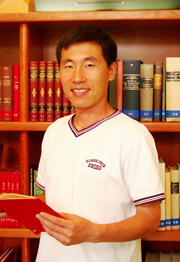People
Dong Shao-xin
Dong Shao-xin

Professor
B.A. in History, Lanzhou University, Lanzhou, Gansu Province (1998); Ph.D. in History, Sun Yat-Sen University, Guangzhou, Guangdong Province (2004); Two years of scholarly visit in Lisbon, Portugal; Post-Doctoral studies at Institute of Historical Geography, Fudan University (2005-2007), and Institute of History, National Tsing Hua University, Taiwan (2007-2008). Now professor in the National Institute for Advanced Humanistic Studies, Fudan University. Research areas include: the history of the intercourse between East and West during 16th-18th centuries; the history of Chinese Christianity; the history of the Portuguese and Dutch expansions in Asia and the history of medicine. Book published: Between Body and Soul: Western Medicine in China during Late Ming and Early Qing Dynasties (Shanghai Ancient Literature Press, 2008).
My main interest of study is the history of the relations, especially the cultural intercourses between Europe and East Asia during the 16th-18th centuries. This is the key period for understanding two main problems that we are facing today: “tradition or modern” and “East or West”. In my first book Between Body and Soul: A Study on Western Medicine in China during 16-18 Centuries (2008), I tried to analyze a series of historical and cultural phenomena caused by the first meeting of the traditional Western medicine with traditional Chinese medicine. Now I am studying on Antonio de Gouvea (1592-1677), a Portuguese Jesuit, who lived in China for almost 40 years. I will attempt to show the ordinary lives of an ordinary Catholic missionary in China, and his studies on Chinese culture and history. The main sources of this study are Gouvea’s works, letters and annual reports. My future researches, on either Catholic mission in China or West-East Asia trade, will be based on Portuguese sources, as well as Chinese ones. I shall select some important Portuguese primary sources and translate them into Chinese with notations. I hope this kind of basic work will be helpful for Chinese academia.